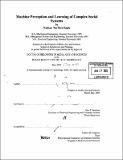Machine perception and learning of complex social systems
Author(s)
Eagle, Nathan Norfleet
DownloadFull printable version (16.50Mb)
Other Contributors
Massachusetts Institute of Technology. Dept. of Architecture. Program In Media Arts and Sciences
Advisor
Alex P. Pentland.
Terms of use
Metadata
Show full item recordAbstract
The study of complex social systems has traditionally been an arduous process, involving extensive surveys, interviews, ethnographic studies, or analysis of online behavior. Today, however, it is possible to use the unprecedented amount of information generated by pervasive mobile phones to provide insights into the dynamics of both individual and group behavior. Information such as continuous proximity, location, communication and activity data, has been gathered from the phones of 100 human subjects at MIT. Systematic measurements from these 100 people over the course of eight months has generated one of the largest datasets of continuous human behavior ever collected, representing over 300,000 hours of daily activity. In this thesis we describe how this data can be used to uncover regular rules and structure in behavior of both individuals and organizations, infer relationships between subjects, verify self- report survey data, and study social network dynamics. By combining theoretical models with rich and systematic measurements, we show it is possible to gain insight into the underlying behavior of complex social systems.
Description
Thesis (Ph. D.)--Massachusetts Institute of Technology, School of Architecture and Planning, Program in Media Arts and Sciences, 2005. Includes bibliographical references (p. 125-136).
Date issued
2005Department
Program in Media Arts and Sciences (Massachusetts Institute of Technology)Publisher
Massachusetts Institute of Technology
Keywords
Architecture. Program In Media Arts and Sciences